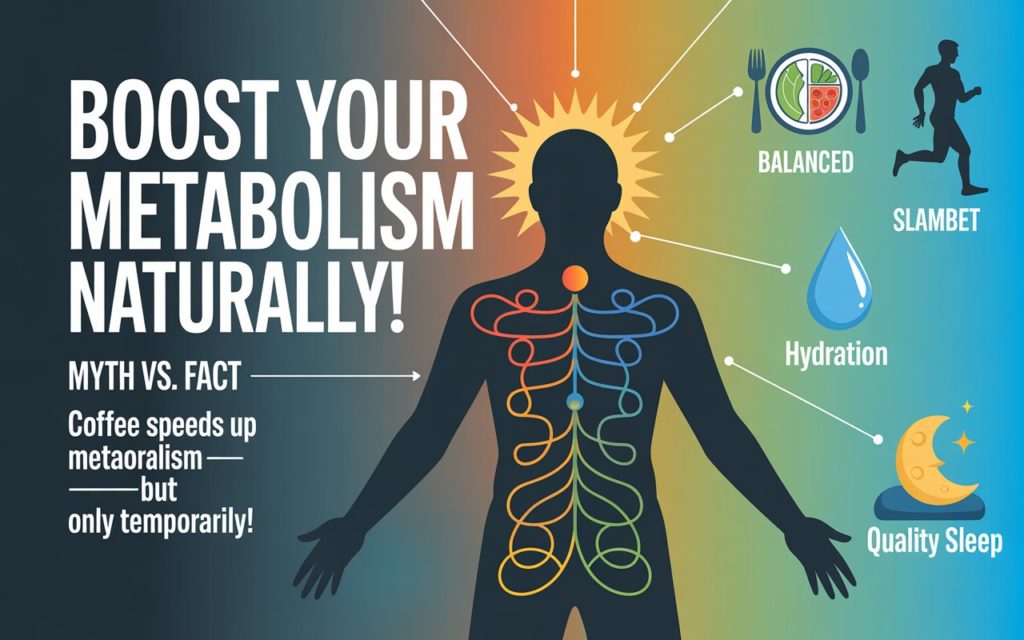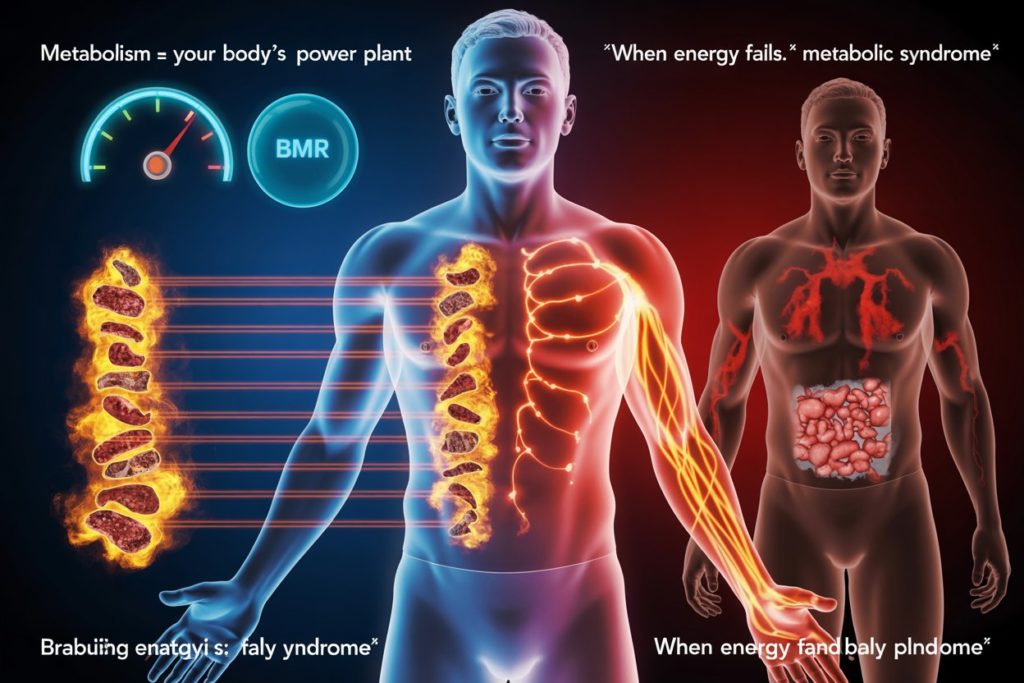Metabolism is the process by which your body converts the food you eat into energy. This energy is essential for all bodily functions, such as walking, thinking, breathing, and growing. Without an efficient metabolism, your body would struggle to function properly. Our specialists at 121 Dietitian provide services to help support your metabolism.
There are two main parts of metabolism. The first part is catabolism. This is when your body breaks down food like carbohydrates, fats, and proteins to release energy. The second part is anabolism. This is when your body uses that energy to build and repair things like muscles, cells, and tissues.
Even when you are not moving—like when you are sitting or sleeping—your body still needs energy. It uses this energy to keep your heart beating, your brain working, and your breathing steady. This basic energy use is called your Basal Metabolic Rate (BMR). Everyone’s BMR is different. It depends on your age, how much muscle you have, your body size, your health, hormones and more.
How Metabolism and Metabolic Syndrome Are Connected
Metabolism and metabolic syndrome are closely connected. Metabolism is the process by which your body converts food into energy, which enables you to move, think, and live. When metabolism is not functioning properly, your body struggles to use energy effectively. Metabolic syndrome occurs when several health issues arise simultaneously. These issues include high blood pressure, high blood sugar, excess belly fat, and unhealthy cholesterol levels.
These problems often result from an improperly functioning metabolism. In summary, metabolic syndrome develops when metabolism is not working correctly, which can negatively impact your health. This is why metabolism and metabolic syndrome are linked.
What Is Metabolic Syndrome?
Metabolic syndrome is a group of health problems that happen together. These problems can make it more likely for someone to get heart disease, diabetes, or a stroke. It means the body isn’t working well when it comes to using energy or controlling blood sugar and fats.
Some of the health problems linked to metabolic syndrome include:
- High blood pressure
- High blood sugar levels
- Too much fat around the belly
- High triglycerides (a kind of fat in the blood)
- Low HDL cholesterol (this is the “good” cholesterol that protects your heart)
Signs of Metabolic Syndrome

Here are some signs that may show someone has metabolic syndrome:
- A larger belly or waist than normal
- Feeling tired all the time
- Being thirsty or hungry more than usual
- Having high blood sugar, especially in the morning before eating
Metabolic Syndrome: Treatment & Reversal
Metabolic syndrome is not just one problem. It is a group of health issues that happen together. These include high blood sugar, high blood pressure, extra fat around the belly, high levels of triglycerides (a type of fat in the blood), and low levels of good cholesterol (HDL).
The good news is that metabolic syndrome can be improved—and even reversed—with healthy changes.
One of the best ways to fix it is by following a long term solutions program with 121 Dietitian using a combination treatment including the Mediterranean diet. Diets like these help lower blood sugar and improve the way your body uses insulin. Adding more fibre-rich foods like chia seeds, beans, and avocados also helps keep your blood sugar steady. It’s important to stay away from sugary foods, white bread, and anything with trans fats.
Regular exercise is another key step. Moving your body every day can make your cells more sensitive to insulin, which helps control blood sugar. Try walking, jogging, or lifting light weights.
Managing stress is just as important. When you are stressed, your body makes more cortisol, a hormone that can make your blood sugar and belly fat worse. Try deep breathing or peaceful hobbies to feel calm.
The best diet for metabolic syndrome includes healthy fats and natural foods. Try to eat more fatty fish like salmon, leafy green vegetables like spinach, nuts, and olive oil. These foods help lower bad fats in the blood and protect your heart.
With the right food, exercise, and stress control, many people can reverse metabolic syndrome and stay healthy for the long term.
The Metabolic Fixing Program
The metabolic fixing programme is a detailed 8-hour programme designed by Gillian Killiner BSc. (Hons) PgDip. MSc. RD to understand and address your metabolic health concerns.
Prior to your initial appointment, you will have completed your background questionnaire and food, fluid, activity, sleep and symptoms diary.
This information is essential to assist the initial 1-hour consultation, which can be online or in our clinic and allows our specialist Dietitian to dive deep into your diet and health.
An in-depth personalised programme will then be created for you which can take 3-4 hours after your initial 1-hour appointment to write up. This will then be provided along with many recipes, a shopping list, and if necessary a request for blood testing. A further 3 reviews and write-ups are included. This will all be based on the information provided and consultations as you progress.
If supplements are required these will be recommended also. The bespoke protocols will be provided within the portal for you to follow for a set number of weeks.
You will then be booked for 30-minute review appointments at intervals as part of the programme to reassess, ensure symptoms are improving along with overall wellness and complete the next step of the programme. Further written information and guidance will be included and sent after your review appointment.
We have helped thousands of patients resolve their diet-related health symptoms and look forward to assisting you with addressing your diet, metabolism and overall health.

Other Metabolic Conditions
Here are a few more related health problems:
- Metabolic latency syndrome – This means the body is slow to adjust to new foods.
- Dual efficient metabolism – A rare condition where the body handles energy in an unusual way.
How to Boost Your Metabolism Naturally: Effective Ways to Increase Metabolic Rate
1. Eat the Right Foods
Eating healthy foods can help your body burn more calories. Protein-rich foods like eggs, chicken, and beans need more energy to digest, which helps boost your metabolism. Spicy foods such as chilli and ginger may also help burn fat by raising your body’s temperature.
Drinks like green tea and coffee contain natural ingredients that can help your body burn more fat. Whole grains and fibre-rich foods like oats, brown rice, and vegetables take more time and energy to digest, which also increases your calorie burn.
2. Build Muscles
Muscles use more energy than fat, even when you’re resting. So, the more muscles you have, the more calories your body burns. Doing strength exercises like push-ups or lifting light weights 2 to 3 times a week can help you build muscle. You can also try HIIT workouts, which means doing fast movements like jumping jacks or running in place, followed by short breaks. These exercises help your body burn more calories even after you’re done.
3. Drink Water
Water is important for all body functions, including metabolism. When you drink enough water, your body works better. Drinking cold water may give a small boost to your metabolism, as your body uses energy to warm it up. Try to drink 8 to 10 glasses of water every day to stay healthy and keep your metabolism active.
4. Sleep Enough
Getting good sleep is important for your health and metabolism. Poor sleep can slow down how your body burns calories. It can also make you feel hungrier the next day. Try to sleep for 7 to 9 hours each night so your body has time to rest and work properly.
5. Reduce Stress
Too much stress is not good for your body. When you’re stressed, your body makes a hormone called cortisol. High levels of cortisol can lead to weight gain and slow metabolism. To feel better and stay healthy, try deep breathing, yoga, or just taking a few minutes of quiet time every day. These simple things can help keep your body calm and your metabolism steady. If your problem doesn’t improve after following these steps, don’t worry.
We are here to help. Please contact us or book a discovery call.
We will look at your case closely and suggest the best solution for your specific health needs.
Our goal is to help you feel better and support you in every step. That’s why the services included in the programme are designed to make things easier for you and guide you toward better health.
How to Speed Up Metabolism After 40
As people get older, especially after 40, metabolism tends to slow down. This happens mainly because the body loses muscle and there are changes in hormones. To keep your metabolism working well after 40, it is important to focus on certain habits. First, eating enough protein is key because protein helps prevent muscle loss, which keeps your metabolism higher. Next, staying active is very helpful. Simple activities like walking and doing resistance training, such as lifting weights or using resistance bands, can build and keep muscle. This helps the body burn more calories even when resting.
Also, it is important to check your hormone levels, especially your thyroid, because it controls how fast your metabolism works. Sometimes, hormonal changes during menopause can make metabolism slower, so managing these changes with the help of a doctor can improve metabolism.
By eating protein, exercising regularly, and paying attention to hormones, people over 40 can boost their metabolism and stay healthy despite the natural age-related metabolic decline.
For people over 60, protein becomes even more important. Eating enough protein helps maintain muscle and keeps your metabolism steady. Staying active is also a must—daily walking, swimming, or using resistance bands can make a big difference. It’s also smart to check your thyroid health. An underactive thyroid (called hypothyroidism) can make your metabolism very slow, so getting tested and treated is important. Some people over 60 also try intermittent fasting. This means eating during certain hours of the day and fasting for the rest. It can help the body use energy better and may support a healthier metabolism.
No matter your age, small changes in diet, exercise, and lifestyle can help you keep your metabolism working well and stay healthy.

Best Drinks to Increase Metabolism
Some drinks can help your body burn more calories and improve your metabolism. Green tea is a popular choice because it has catechins, a natural substance that helps your body burn fat faster. Drinking black coffee also helps because caffeine boosts your energy and helps your nervous system work harder, which burns more calories. Another good option is lemon water. It helps with digestion and keeps your body hydrated, which is important for a healthy metabolism. Ginger tea is also helpful because it increases your body’s heat, which can make your body use more energy. Drinking these healthy beverages daily may give your metabolism a little boost, especially when combined with healthy eating and regular exercise.
Metabolism Booster Pills: Do They Work?
There are many pills and supplements that claim to boost metabolism, but they don’t always work for everyone. Some of these pills include Garcinia Cambogia, which may help reduce hunger, and raspberry ketones, which are said to help burn fat. Another one is CLA (Conjugated Linoleic Acid), which might help in fat loss. However, these supplements can have side effects, and some may not be safe for everyone. That’s why it’s important to talk to a Dietitian before trying any metabolism pills. Eating healthy and staying active are still the safest and best ways to boost your metabolism.
Who is this programme for?
This programme is for anyone struggling with tiredness, weight gain, poor sleep, stress, or low energy – even after trying to live a healthy lifestyle. It’s also helpful for people with slow metabolism or autoimmune concerns.
Q2: How long does the full programme take?
The programme includes 4 sessions spread over several weeks. Each step is planned carefully to match your progress and needs.
Q3: Do I need to attend the sessions in person?
No. You can choose to attend online or in-person at our clinic – whatever suits you best.
Q4: What do I need to do before the first appointment?
You’ll fill out a background questionnaire and a simple diary (food, drinks, sleep, and symptoms). This helps us understand your current habits and health.
Q5: What’s included in the full plan?
You’ll receive:
- A full personalised health and diet plan
- Simple recipes and a shopping list
- Supplement advice (if needed)
- Blood test recommendations (if needed)
- 3 follow-up reviews with updates
- Ongoing support in your secure health portal
Q6: Are supplements or blood tests included in the price?
No. If supplements or tests are recommended, they are separate from the programme cost. You’ll receive advice on what’s needed and why.
Q7: How soon will I see results?
Many people start feeling better within a few weeks. It depends on your body, health history, and how closely you follow the plan.
Q8: Can this programme help with weight loss?
Yes. The programme supports healthy, long-term weight loss by improving your metabolism and addressing root causes like stress, sleep, or hormone imbalances.
Q9: Will I get meal plans or food lists?
Yes. You’ll receive meal ideas, recipes, and a shopping list based on your personal health needs.
Q10: How do I book the programme?
It’s easy! Just click the link below to choose your service or package:
👉 Book a Service
👉 Book the Full Package
Links included in this description might be Amazon affiliate links. If you purchase a product or service with the links that I provide I may receive a small commission.